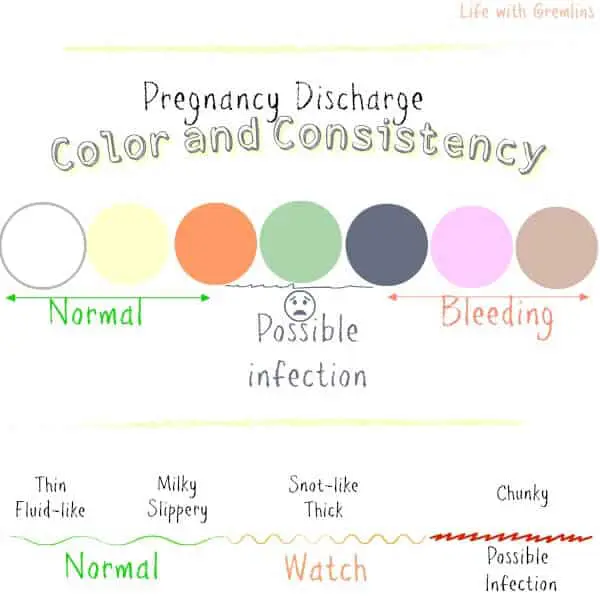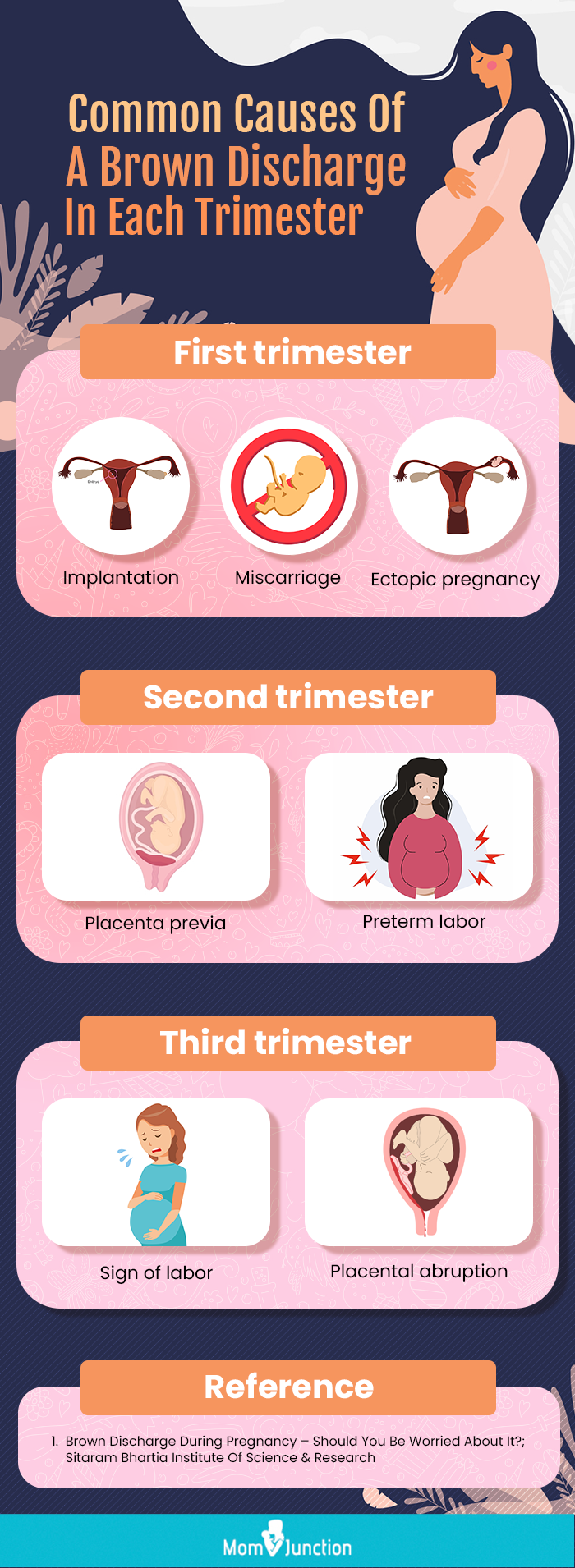Brown Discharge While Pregnant First Trimester
Brown Discharge While Pregnant First Trimester - A combination of hormonal changes and increased blood flow in the body makes the cervix extra sensitive during. In most cases, it’s completely harmless. Bleeding or brown discharge can be a sign of vaginal or cervical infection, such as bacterial vaginosis (bv), trichomoniasis, chlamydia, or gonorrhea. Having an infection during pregnancy can increase your risk of. The good news is, brown discharge during pregnancy is usually normal and very likely does not mean something is wrong with you or your baby. What causes brown discharge during. What causes brown discharge during pregnancy? Dark brown discharge during pregnancy could be dried blood leaving your body, underwood explains. One of the most common causes of brown discharge and spotting in early pregnancy is cervical irritation. Brown discharge is often old blood which has turned from red to brown and is usually nothing to be concerned about, but if it continues, you can seek advice from your.
What causes brown discharge during pregnancy? What causes brown discharge during. The good news is, brown discharge during pregnancy is usually normal and very likely does not mean something is wrong with you or your baby. Brown discharge is often old blood which has turned from red to brown and is usually nothing to be concerned about, but if it continues, you can seek advice from your. One of the most common causes of brown discharge and spotting in early pregnancy is cervical irritation. Bleeding or brown discharge can be a sign of vaginal or cervical infection, such as bacterial vaginosis (bv), trichomoniasis, chlamydia, or gonorrhea. A combination of hormonal changes and increased blood flow in the body makes the cervix extra sensitive during. In most cases, it’s completely harmless. Having an infection during pregnancy can increase your risk of. Dark brown discharge during pregnancy could be dried blood leaving your body, underwood explains.
One of the most common causes of brown discharge and spotting in early pregnancy is cervical irritation. What causes brown discharge during. Brown discharge is often old blood which has turned from red to brown and is usually nothing to be concerned about, but if it continues, you can seek advice from your. Bleeding or brown discharge can be a sign of vaginal or cervical infection, such as bacterial vaginosis (bv), trichomoniasis, chlamydia, or gonorrhea. In most cases, it’s completely harmless. What causes brown discharge during pregnancy? The good news is, brown discharge during pregnancy is usually normal and very likely does not mean something is wrong with you or your baby. Dark brown discharge during pregnancy could be dried blood leaving your body, underwood explains. Having an infection during pregnancy can increase your risk of. A combination of hormonal changes and increased blood flow in the body makes the cervix extra sensitive during.
Brown Discharge in Pregnancy Causes, Symptoms, and Next Steps
A combination of hormonal changes and increased blood flow in the body makes the cervix extra sensitive during. What causes brown discharge during. One of the most common causes of brown discharge and spotting in early pregnancy is cervical irritation. The good news is, brown discharge during pregnancy is usually normal and very likely does not mean something is wrong.
7 weeks light brown discharge BabyCenter
A combination of hormonal changes and increased blood flow in the body makes the cervix extra sensitive during. Bleeding or brown discharge can be a sign of vaginal or cervical infection, such as bacterial vaginosis (bv), trichomoniasis, chlamydia, or gonorrhea. The good news is, brown discharge during pregnancy is usually normal and very likely does not mean something is wrong.
Understanding Brown Discharge During The First Trimester Of Pregnancy
What causes brown discharge during pregnancy? Bleeding or brown discharge can be a sign of vaginal or cervical infection, such as bacterial vaginosis (bv), trichomoniasis, chlamydia, or gonorrhea. Having an infection during pregnancy can increase your risk of. In most cases, it’s completely harmless. What causes brown discharge during.
7 weeks 1 day Brown Discharge photos attached June 2020 Babies
A combination of hormonal changes and increased blood flow in the body makes the cervix extra sensitive during. Dark brown discharge during pregnancy could be dried blood leaving your body, underwood explains. Bleeding or brown discharge can be a sign of vaginal or cervical infection, such as bacterial vaginosis (bv), trichomoniasis, chlamydia, or gonorrhea. In most cases, it’s completely harmless..
Yellow Discharge During Pregnancy Possible Causes And Treatment
What causes brown discharge during. A combination of hormonal changes and increased blood flow in the body makes the cervix extra sensitive during. One of the most common causes of brown discharge and spotting in early pregnancy is cervical irritation. The good news is, brown discharge during pregnancy is usually normal and very likely does not mean something is wrong.
Discharge During Pregnancy Color and Consistency Causes
In most cases, it’s completely harmless. What causes brown discharge during pregnancy? One of the most common causes of brown discharge and spotting in early pregnancy is cervical irritation. Dark brown discharge during pregnancy could be dried blood leaving your body, underwood explains. The good news is, brown discharge during pregnancy is usually normal and very likely does not mean.
Brown Discharge Pictures Of Spotting During Pregnancy Implantation
Dark brown discharge during pregnancy could be dried blood leaving your body, underwood explains. What causes brown discharge during. A combination of hormonal changes and increased blood flow in the body makes the cervix extra sensitive during. In most cases, it’s completely harmless. Having an infection during pregnancy can increase your risk of.
Dark Brown Discharge
A combination of hormonal changes and increased blood flow in the body makes the cervix extra sensitive during. The good news is, brown discharge during pregnancy is usually normal and very likely does not mean something is wrong with you or your baby. Dark brown discharge during pregnancy could be dried blood leaving your body, underwood explains. What causes brown.
How to Stop Brown Discharge During Pregnancy? What to Do?
Bleeding or brown discharge can be a sign of vaginal or cervical infection, such as bacterial vaginosis (bv), trichomoniasis, chlamydia, or gonorrhea. The good news is, brown discharge during pregnancy is usually normal and very likely does not mean something is wrong with you or your baby. What causes brown discharge during pregnancy? Having an infection during pregnancy can increase.
7 weeks 1 day Brown Discharge photos attached June 2020 Babies
What causes brown discharge during. Dark brown discharge during pregnancy could be dried blood leaving your body, underwood explains. The good news is, brown discharge during pregnancy is usually normal and very likely does not mean something is wrong with you or your baby. In most cases, it’s completely harmless. Having an infection during pregnancy can increase your risk of.
What Causes Brown Discharge During Pregnancy?
One of the most common causes of brown discharge and spotting in early pregnancy is cervical irritation. Dark brown discharge during pregnancy could be dried blood leaving your body, underwood explains. Brown discharge is often old blood which has turned from red to brown and is usually nothing to be concerned about, but if it continues, you can seek advice from your. What causes brown discharge during.
Having An Infection During Pregnancy Can Increase Your Risk Of.
Bleeding or brown discharge can be a sign of vaginal or cervical infection, such as bacterial vaginosis (bv), trichomoniasis, chlamydia, or gonorrhea. A combination of hormonal changes and increased blood flow in the body makes the cervix extra sensitive during. The good news is, brown discharge during pregnancy is usually normal and very likely does not mean something is wrong with you or your baby. In most cases, it’s completely harmless.








